- About Us
- Columns
- Letters
- Cartoons
- The Udder Limits
- Archives
- Ezy Reading Archive
- 2024 Cud Archives
- 2023 Cud Archives
- 2022 Cud Archives
- 2021 Cud Archives
- 2020 Cud Archives
- 2015-2019
- 2010-2014
- 2004-2009
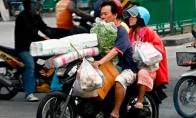 |
The Cud Short Fiction: |
A lonely traffic circle in Phuket City, Thailand. 5:15 in the morning. September, 2007.
"Where you go?" asked the motorbike taxi driver.
"Bus station."
"Alai wa?” He didn't understand.
"Bus station. Bus."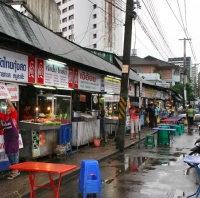
I began the animated pantomime of foreigners, trying to draw a bus in the air like a child writes their name with a sparkler. When he didn't respond I started a game of charades showing the driver of a motorbike, then a car with a small steering wheel, then a bus driver with his hands controlling a large wheel and shifting gears. Each pantomime was accompanied by an engine sound of a lower pitch.
A language barrier often makes foreigners look childish or special. I don't think it was ever truer than for me at that moment, when a Thai man and myself were the sole occupants of a large urban traffic circle, before dawn, and I stood there gesticulating wildly in an effort to communicate a single word. I wanted to get to the airport on time because I had grown weary of that country. I wanted to leave Thailand behind me because, among other reasons, after spending eight months of my life there, I was unable to say, "bus station."
It was a 45-minute trip from the center of Phuket City to the airport. Each passing minute made it less likely that I would make it to the bus station for my shuttle. The driver did acknowledge the word "airport," which made my choice clear. In desperation, I would have to ride on the back of his bike the whole way, or I wouldn't make my flight.
So I secured myself the best I could on the back of his single seat motorbike. I had a big pack on my back and a small one on my chest. There was so little room for the two of us and my two packs that I sat on my hands to use my forearms as a seatback. I put my feet in front of the foot p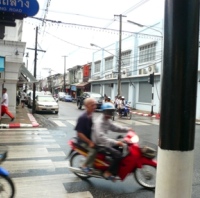 egs and pulled back toward me, as a counterweight against my body falling backward. The driver took off through the city, laboriously balancing the top-heavy bike and negotiating the compact streets.
egs and pulled back toward me, as a counterweight against my body falling backward. The driver took off through the city, laboriously balancing the top-heavy bike and negotiating the compact streets.
The sun started to throw orange and purple rays over the horizon, lighting the thick clouds from below in a way that made the world seem like a cathedral. I watched with ambivalence as the early risers began their day. I was imagining optimistically what lay ahead for me, but also reluctant to close the door on what I was leaving behind. We were soon out of the city and onto the highway. The engine grew hot against my bare legs.
It was just before dawn and we were racing down the shoulder of the highway at top speed. Cars and trucks—big trucks—passed us at regular intervals. The road was still wet from an overnight storm. I had no helmet, because I had those skewed values that permit you to do things in a foreign land that you would never do at home.
I saw the dog just in time to realize we would collide. There is a sound so distinct when a vehicle hits an animal that even a blind passenger can tell that it is not ice or wood or a trash bag, but flesh and bone.
The front wheel cocked to the left, which doomed our chances of staying upright. For a moment I was stretched out in the air like I was diving into the road ahead of me. I landed on the driver—which possibly saved my life—then bounced onto the road. My two packs kept me from rolling, so I slid on my left side down the gritty road, lubricated by my own blood. When I came to a stop, I saw the water bottle that ejected from my pack still skimming the road like a torpedo.
It was then that I felt vulnerable. Like the inside of a building destroyed by fire, there was a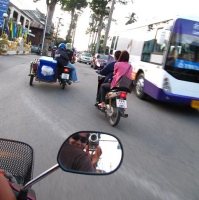 sensation that life did not belong there. My karma was good enough that there was no vehicle bearing down on me, so I hauled myself to the side of the road.
sensation that life did not belong there. My karma was good enough that there was no vehicle bearing down on me, so I hauled myself to the side of the road.
The driver was also getting up. A bystander from the community along the highway went to his aid as I stood there disoriented, wishing for an instant jump to the comforts of home. But in the words of Bob Dylan, there was nothing to do but keep on keepin' on.
The driver rolled the barely damaged bike back to me. After a few kick-starts to get the fluids back in the lines, it settled into its snare drum tat-tat-tat.
"OK, go airport."
He looked at me and we both smiled. His helmet was scoured and had wispy white flakes of plastic pulled out of it like the fabric of a thick sweater. We were bonded through that experience. We knew absolutely nothing about each other, but we had bled together. His helmet had saved his skull, and mine had been saved by landing on top of him. Beyond that, we each had swaths of skin missing from our bodies—his spread around both sides, mine concentrated on my left side.
"OK, go airport," I echoed.
As I retook my seat a bystander judged the distance between two moving cars and ran into the road. He grabbed the dead dog by its foot and dragged it off the road.
For the remainder of the trip, the driver occasionally muttered, "Dog no good. Dog no good." This time it was he who could not properly express himself. With one hand he made gestures in the air, like the child with a sparkler. I had no idea what he was drawing, so I just stared at him blankly.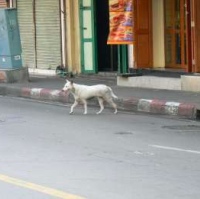
I was confident, though without basis, that nothing worse would happen to me that day, so I didn't mind that he turned his head to look back at me when he said it.
When we arrived at the airport I wasn't yet in pain. The bleeding had slowed but the adrenaline had not. I paid the full fare without hesitating—which surprised me—and I refused the gasoline-soaked rag that he had pulled from under the seat to wipe his own wounds—which surprised him. He squared his shoulders to me and offered his hand, but I chose instead to offer him a Thai bow.
A little farther down the terminal, the shuttle bus I was hoping to catch was departing back to the city. I pointed at it and said, "bus." He nodded and said "bus" with such a minor difference in pronunciation that I could only shake my head. Blood dripped from the hand with which I pointed. The driver looked at it and said, "Dog no good." I gestured with my thumb to the terminal behind me and said, "OK, go airport."
Brian Spigel is a reformed world traveler based in Portland, Maine, USA. After stints in various American national parks, Antarctica, Thailand, Australia, and the Appalachian Trail, he is currently attempting to live a so-called normal life in Portland, Maine.
